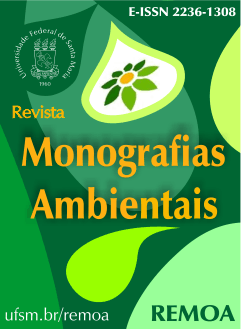Diagnóstico ambiental: uma pesquisa exploratória na região fronteira oeste do Rio Grande do Sul
DOI:
https://doi.org/10.5902/223613087594Palavras-chave:
Consultoria ambiental, Gestão Ambiental, Meio AmbienteResumo
Na área da Gestão Ambiental, a assessoria e consultoria ambiental destacam-se como segmentos bastante promissores. A demanda por este ramo de trabalho tem crescido devido à Legislação Ambiental Brasileira ser uma das mais bem elaboradas do mundo e pela rigorosa cobrança por parte dos órgãos ambientais, para que as empresas cumpram as exigências da lei. Através dos estudos constatou-se que ainda é pequeno o número de empresas que procuram por serviços de consultoria ou assessoria ambiental no município estudado. Observou-se no setor serviços um maior planejamento em relação às questões ambientais, sendo que muitas organizações inseriram-nas em seus orçamentos, buscando identificar oportunidades de reduzir os custos voltados ao meio ambiente. Ainda, quanto à atuação do gestor ambiental notou-se que existe uma resistência à incorporação de ações as quais minimizem os impactos causados por seus empreendimentos ao meio ambiente e uma falta de informação sobre os sistemas de gestão ambiental e a atuação dos profissionais da área.
Downloads
Referências
ALMEIDA, F. Os Desafios da Sustentabilidade uma ruptura urgente. 3. ed. Rio de Janeiro: Elsevier Campus, 2007.
BRASIL, LEI Nº 6.938, de 31 de Agosto de 1981. Dispõe sobre a Política Nacional do Meio Ambiente, seus fins e mecanismos de formulação e aplicação e dá outras providências.
BRASIL. Ministério do Meio Ambiente, Conselho Nacional do Meio Ambiente (CONAMA). Resolução Nº001/86, de 23 de Janeiro de 1986. Considera-se impacto ambiental qualquer alteração das propriedades físicas, químicas e biológicas do meio ambiente, causada por qualquer forma de matéria ou energia resultante das atividades humanas.
BRASIL PROFISSÕES. Gestor ambiental. Disponível em: http://www.brasilprofissoes.com.br/profissoes/gestorambiental. Acesso em: 10 de Setembro de 2012.
CROCCO, L., GUTTMANN, E. Consultoria Empresarial. São Paulo: Saraiva, 2005. Declaração do Rio sobre Meio Ambiente e Desenvolvimento. Disponível em:
http://www.mma.gov.br/port/sdi/ea/documentos/convs/decl_rio92.pdf. Acessado em 02 de Setembro de 2012.
DIAS, R. Gestão Ambiental: Responsabilidade Social e Sustentabilidade. São Paulo: Atlas, 2009.
DONAIRE, Denis. Gestão Ambiental na Empresa. 2. ed. São Paulo: Atlas, 2009.
FARIAS, L.G.Q, GÓES, A.O.S. JÚNIOR, A.C.S. Gestão ambiental e tecnologias ambientais: Práticas e benefícios em uma indústria alimentícia no Sul da Bahia. RGSA – Revista de Gestão Social e Ambiental. V.4, Nº.1, p. 80-911, 2010.
GIL, Antônio Carlos. Como elaborar projetos de pesquisa. São Paulo, 5ª edição, 2010. Editora Atlas.
LA ROVERE, E. L.; D'AVIGNON, A.; PIERRE, C. V.; KLIGERMAN, D. C.; SILVA, H. V. O.; BARATA, M. M. L.; MALHEIROS, T. M. M. Manual de auditoria ambiental. 2. ed. Rio de Janeiro: Qualitymark, 2001.
LEFF, E. Saber Ambiental- Sustentabilidade, Racionalidade, Complexidade, Poder. Petróplis-RJ: Vozes/ PNUMA, 2001, 343 p.
MARCONI,M.A., LAKATOS, E.M. Fundamentos de metodologia cientifica. 7. Ed., São Paulo: Atlas, 2010.
MOURA, L. A. A. Qualidade e Gestão Ambiental. 5. ed. São Paulo: Juarez de Oliveira, 2008.
OLIVEIRA, D. P. R. Manual de Consultoria Empresarial: conceitos, metodologia, práticas. 8. ed. São Paulo: Atlas, 2009.
PHILIPPI JR., A., ROMÉRO, M. A., BRUNA, G. C. Uma Introdução à Gestão Ambiental. In: PHILIPPI JR., A., ROMÉRO, M. A., BRUNA, G. C. Curso de Gestão Ambiental. Barueri, SP: Manole, 2004.
TEIXEIRA, M. G. C.; BESSA, E. S. Estratégias para Compatibilizar Desenvolvimento Econômico e Gestão Ambiental
numa Atividade Produtiva Local. RAC, v. 13, edição especial, p. 1-18, 2009. Disponível em: http://www.anpad.org.br/rac
VALLE, C. E. Qualidade Ambiental: ISO 14000. 8. ed. São Paulo: Senac, 2002. World Business Council for Sustainable Development. Disponível em: http://www.wbcsd.org/templates/TemplateWBCSD5/layout.asp?MenuID=1. Acesso em: 5 de Setembro de 2012.
Downloads
Publicado
Como Citar
Edição
Seção
Licença
Ethical guidelines for journal publication
The REMOA is committed to ensuring ethics in publication and quality of articles.
Conformance to standards of ethical behavior is therefore expected of all parties involved: Authors, Editors, Reviewers, and the Publisher.
In particular,
Authors: Authors should present an objective discussion of the significance of research work as well as sufficient detail and references to permit others to replicate the experiments. Fraudulent or knowingly inaccurate statements constitute unethical behavior and are unacceptable. Review articles should also be objective, comprehensive, and accurate accounts of the state of the art. The authors should ensure that their work is entirely original works, and if the work and/or words of others have been used, this has been appropriately acknowledged. Plagiarism in all its forms constitutes unethical publishing behavior and is unacceptable. Submitting the same manuscript to more than one journal concurrently constitutes unethical publishing behavior and is unacceptable. Authors should not submit articles describing essentially the same research to more than one journal. The corresponding author should ensure that there is a full consensus of all co-authors in approving the final version of the paper and its submission for publication.
Editors: Editors should evaluate manuscripts exclusively on the basis of their academic merit. An editor must not use unpublished information in the editor's own research without the express written consent of the author. Editors should take reasonable responsive measures when ethical complaints have been presented concerning a submitted manuscript or published paper.
Reviewers: Any manuscripts received for review must be treated as confidential documents. Privileged information or ideas obtained through peer review must be kept confidential and not used for personal advantage. Reviews should be conducted objectively, and observations should be formulated clearly with supporting arguments, so that authors can use them for improving the paper. Any selected referee who feels unqualified to review the research reported in a manuscript or knows that its prompt review will be impossible should notify the editor and excuse himself from the review process. Reviewers should not consider manuscripts in which they have conflicts of interest resulting from competitive, collaborative, or other relationships or connections with any of the authors, companies, or institutions connected to the papers.






